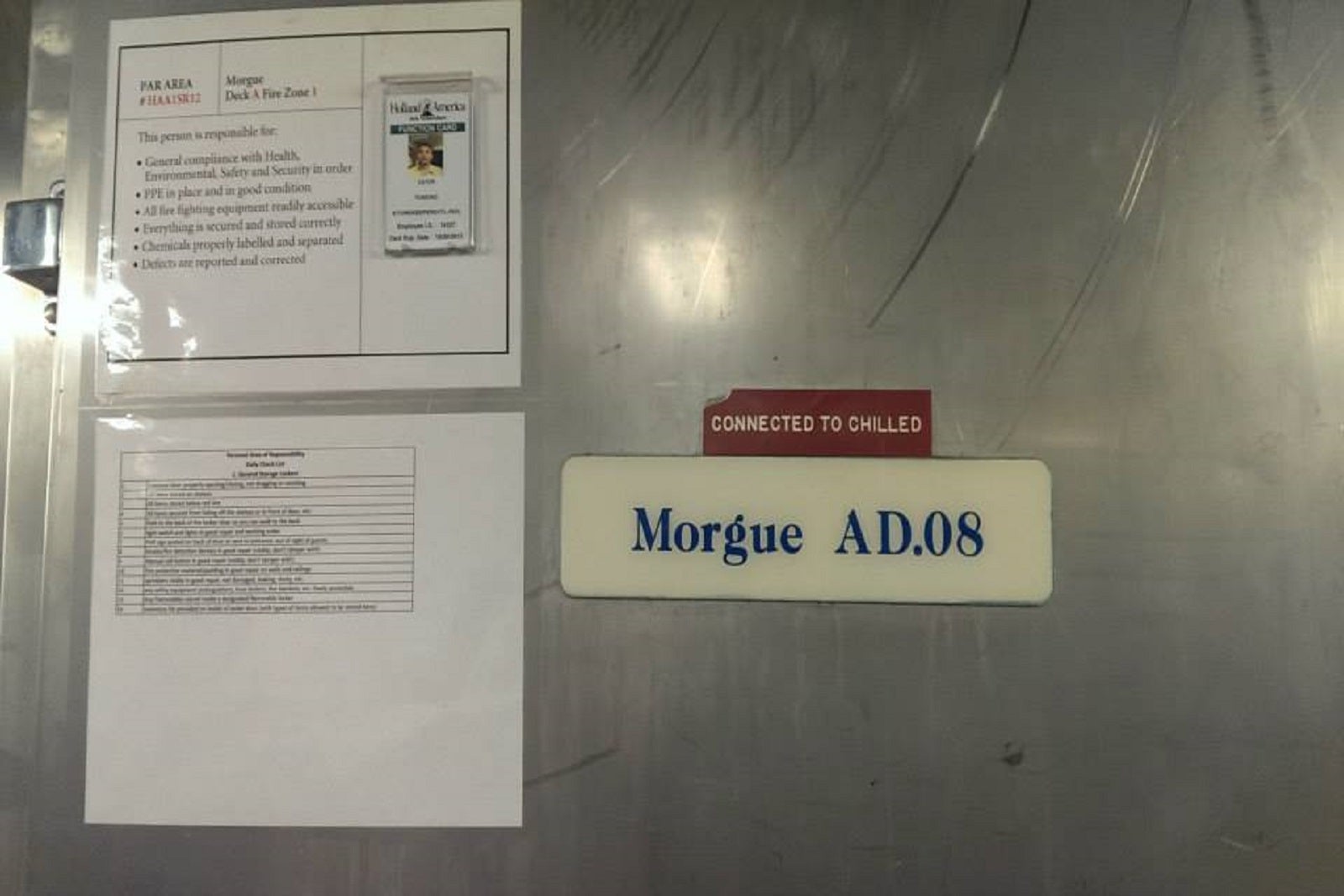Do cruise ships have morgues?
Nobody wants to think about what could go wrong on vacation, but at some point, you might find yourself offhandedly wondering about cruise ship morgues. Do they exist? Where are they housed? What happens if someone dies on a cruise ship?
Are there morgues on cruise ships?
Yes, there are morgues on most of the world's largest cruise ships. The larger the ship, the larger the morgue's capacity. Vessels are also required to carry body bags.
Cruise morgues are stainless steel refrigerated rooms with shelves where bodies are stored, either until the end of the voyage or until they can be disembarked in a port of call and repatriated.
Morgues are located on ships' lowest decks, generally along what the crew refers to as "I-95" — the long corridor that runs from one end of the vessel to the other. It houses storage for everything from food and alcohol to fresh flowers and miscellaneous ship equipment. (Don't worry; the morgues are kept well away from areas where food is stored.)
What happens when someone dies on a cruise ship?
All cruise lines have procedures in place to handle the situation if someone dies during a sailing. When it happens, ship officials immediately notify shoreside authorities. Members of the medical team will assess, and the body will be moved to the morgue until further arrangements can be made.
The onboard team is equipped to assist the deceased's travel companions with things like emotional support, notification of family members, and arrangements for early disembarkation and repatriation.

Returning a body home is expensive if the person who died didn't live close to where their body is removed from the vessel. The cost associated with it is the responsibility of the passenger or their family or other travel companions, rather than the cruise line. (Note that some travel insurance policies offer coverage for it.)
How soon a body can be offloaded depends on several factors, including local regulations, where the ship is in its itinerary and where the vessel is flagged. Generally, remains are removed from ships in the next major port of call, where the proper infrastructure exists to handle them.
Got more cruise questions? TPG has answers:
- Man overboard: Why do people fall off cruise ships?
- What is baked Alaska, and why is it paraded around cruise ships?
- What are the largest cruise ships in the world?
- What is a gentleman host on a cruise?
- What is the Jones Act and how does it affect cruise ships?
- What is a lido deck on a cruise ship?
- What's a cruise cabin guarantee and will it save you money?
- What's the difference between a cruise concierge and a butler?
TPG featured card
at Capital One's secure site
Terms & restrictions apply. See rates & fees.
| 5X miles | Earn 5X miles on hotels, vacation rentals and rental cars booked through Capital One Travel |
| 2X miles | Earn unlimited 2X miles on every purchase, every day |
Pros
- Stellar welcome offer of 75,000 miles after spending $4,000 on purchases in the first three months from account opening. Plus, a $250 Capital One Travel credit to use in your first cardholder year upon account opening.
- You'll earn 2 miles per dollar on every purchase, which means you won't have to worry about memorizing bonus categories
- Rewards are versatile and can be redeemed for a statement credit or transferred to Capital One’s transfer partners
Cons
- Highest bonus-earning categories only on travel booked via Capital One Travel
- LIMITED-TIME OFFER: Enjoy $250 to use on Capital One Travel in your first cardholder year, plus earn 75,000 bonus miles once you spend $4,000 on purchases within the first 3 months from account opening - that’s equal to $1,000 in travel
- Earn unlimited 2X miles on every purchase, every day
- Earn 5X miles on hotels, vacation rentals and rental cars booked through Capital One Travel
- Miles won't expire for the life of the account and there's no limit to how many you can earn
- Receive up to a $120 credit for Global Entry or TSA PreCheck®
- Use your miles to get reimbursed for any travel purchase—or redeem by booking a trip through Capital One Travel
- Enjoy a $50 experience credit and other premium benefits with every hotel and vacation rental booked from the Lifestyle Collection
- Transfer your miles to your choice of 15+ travel loyalty programs
- Top rated mobile app


